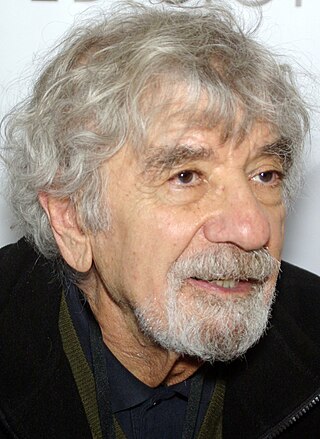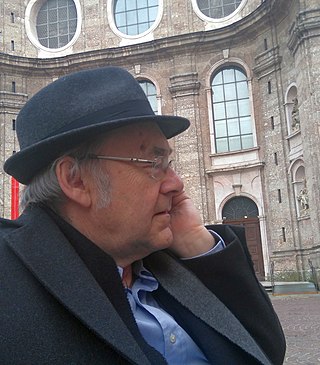Related Research Articles

Heinz von Foerster was an Austrian American scientist combining physics and philosophy, and widely attributed as the originator of Second-order cybernetics. He was twice a Guggenheim fellow and also was a fellow of the American Association for the Advancement of Science, 1980. He is well known for his 1960 Doomsday equation formula published in Science predicting future population growth.

In the fields of sociology, social ontology, and communication theory, social constructionism proposes that certain ideas about physical reality arise from collaborative consensus, instead of the pure observation of said physical reality. The theory of social constructionism proposes that people collectively develop the meanings of social constructs. Social constructionism has been characterised as neo-Marxian theory and as a neo-Kantian theory, proposing that social constructionism replaces the transcendental subject with a societal concept that is descriptive and normative.
Social constructivism is a sociological theory of knowledge according to which human development is socially situated and knowledge is constructed through interaction with others.

Constructivism is a view in the philosophy of science that maintains that scientific knowledge is constructed by the scientific community, which seeks to measure and construct models of the natural world. According to the constructivist, natural science, therefore, consists of mental constructs that aim to explain sensory experience and measurements.

Constructivism is a theory in education which posits that individuals or learners do not acquire knowledge and understanding by passively perceiving it within a direct process of knowledge transmission, rather they construct new understandings and knowledge through experience and social discourse, integrating new information with what they already know. For children, this includes knowledge gained prior to entering school. It is associated with various philosophical positions, particularly in epistemology as well as ontology, politics, and ethics. The origin of the theory is also linked to Swiss developmental psychologist Jean Piaget's theory of cognitive development.
Ernst von Glasersfeld was a philosopher, and emeritus professor of psychology at the University of Georgia, research associate at the Scientific Reasoning Research Institute, and adjunct professor in the Department of Psychology at the University of Massachusetts Amherst. He was a member of the board of trustees of the American Society for Cybernetics, from which he received the McCulloch Memorial Award in 1991. He was a member of the scientific board of the Instituto Piaget, Lisbon. Glasersfeld is known for the development of radical constructivism.
Radical constructivism is an approach to epistemology that situates knowledge in terms of knowers' experience. It looks to break with the conception of knowledge as a correspondence between a knower's understanding of their experience and the world beyond that experience. Adopting a sceptical position towards correspondence as in principle impossible to verify because one cannot access the world beyond one's experience in order to test the relation, radical constructivists look to redefine epistemology in terms of the viability of knowledge within knowers' experience. This break from the traditional framing of epistemology differentiates it from "trivial" forms of constructivism that emphasise the role of the knower in constructing knowledge while maintaining the traditional perspective of knowledge in terms of correspondence. Radical constructivism has been described as a "post-epistemological" position.
Second-order cybernetics, also known as the cybernetics of cybernetics, is the recursive application of cybernetics to itself and the reflexive practice of cybernetics according to such a critique. It is cybernetics where "the role of the observer is appreciated and acknowledged rather than disguised, as had become traditional in western science". Second-order cybernetics was developed between the late 1960s and mid 1970s by Heinz von Foerster and others, with key inspiration coming from Margaret Mead. Foerster referred to it as "the control of control and the communication of communication" and differentiated first order cybernetics as "the cybernetics of observed systems" and second-order cybernetics as "the cybernetics of observing systems". It is closely allied to radical constructivism, which was developed around the same time by Ernst von Glasersfeld. While it is sometimes considered a break from the earlier concerns of cybernetics, there is much continuity with previous work and it can be thought of as a distinct tradition within cybernetics, with origins in issues evident during the Macy conferences in which cybernetics was initially developed. Its concerns include autonomy, epistemology, ethics, language, reflexivity, self-consistency, self-referentiality, and self-organizing capabilities of complex systems. It has been characterised as cybernetics where "circularity is taken seriously".
Constructivist teaching is based on constructivist learning theory. Constructivist teaching is based on the belief that learning occurs as learners are actively involved in a process of meaning and knowledge construction as opposed to passively receiving information.
Enactivism is a position in cognitive science that argues that cognition arises through a dynamic interaction between an acting organism and its environment. It claims that the environment of an organism is brought about, or enacted, by the active exercise of that organism's sensorimotor processes. "The key point, then, is that the species brings forth and specifies its own domain of problems ...this domain does not exist "out there" in an environment that acts as a landing pad for organisms that somehow drop or parachute into the world. Instead, living beings and their environments stand in relation to each other through mutual specification or codetermination" (p. 198). "Organisms do not passively receive information from their environments, which they then translate into internal representations. Natural cognitive systems...participate in the generation of meaning ...engaging in transformational and not merely informational interactions: they enact a world." These authors suggest that the increasing emphasis upon enactive terminology presages a new era in thinking about cognitive science. How the actions involved in enactivism relate to age-old questions about free will remains a topic of active debate.
Ranulph Glanville was an Anglo-Irish cybernetician and design theorist. He was a founding vice-president of the International Academy for Systems and Cybernetic Sciences (2006–2009) and president of the American Society for Cybernetics (2009–2014).

Humberto Maturana Romesín was a Chilean biologist and philosopher. Many consider him a member of a group of second-order cybernetics theoreticians such as Heinz von Foerster, Gordon Pask, Herbert Brün and Ernst von Glasersfeld.
In psychology, constructivism refers to many schools of thought that, though extraordinarily different in their techniques, are all connected by a common critique of previous standard approaches, and by shared assumptions about the active constructive nature of human knowledge. In particular, the critique is aimed at the "associationist" postulate of empiricism, "by which the mind is conceived as a passive system that gathers its contents from its environment and, through the act of knowing, produces a copy of the order of reality".

Stuart Anspach Umpleby is an American cybernetician and professor in the Department of Management and Director of the Research Program in Social and Organizational Learning in the School of Business at the George Washington University.

The American Society for Cybernetics (ASC) is an American non-profit scholastic organization for the advancement of cybernetics as a science, a discipline, a meta-discipline and the promotion of cybernetics as basis for an interdisciplinary discourse. The society does this by developing and applying cybernetics’ concepts which are presented and published via its conferences and peer-reviewed publications. As a meta-discipline, it creates bridges between disciplines, philosophies, sciences, and arts. The ASC is a full member of the International Federation for Systems Research (IFSR).

Cybernetics is a wide-ranging field concerned with circular causal processes such as feedback. Norbert Wiener named the field after an example of circular causal feedback—that of steering a ship where the helmsman adjusts their steering in response to the effect it is observed as having, enabling a steady course to be maintained amongst disturbances such as cross-winds or the tide.
Markus F. Peschl is an Austrian cognitive scientist, philosopher of mind, philosopher of science and researcher on innovation, and professor for Cognitive Science and Philosophy of Science at the University of Vienna, Austria. He is known for his early work on cognitive modelling, and his more recent work concerning a"socio-epistemological approach to innovation."
Laurence Dale Richards was a key figure in the modern development of cybernetics as a transdisciplinary field of inquiry, often referred to as the new cybernetics. He was the first to create interdisciplinary masters and doctoral programs in engineering management, with curricula built explicitly on concepts drawn from systems theory and cybernetics. He served as President for both the American Society for Cybernetics (1986–88) and the American Society for Engineering Management (1998–99) and was elected an Academician in the International Academy for Systems and Cybernetic Sciences in 2010.

The Dream of Reality: Heinz von Foerster's Constructivism is a book by Lynn Segal first published in 1986. Segal, a licensed clinical social worker, examines the constructivist epistemology of physicist and philosopher Heinz von Foerster. Originally intended as a transcription of von Foerster's lectures, the book evolved into Segal's interpretation of von Foerster's constructivism written in everyday language.

Josef Mitterer is an Austrian philosopher, and a retired professor at the University of Klagenfurt Department of Philosophy.
References
- ↑ "Constructivist Foundations". constructivist.info. Retrieved 2020-02-19.
- ↑ "American Society for Cybernetics - 2005 Conference Main Page". www.asc-cybernetics.org. Retrieved 2020-02-19.
- ↑ "ASC Conference 2005 – Stuart Umpleby's Website". blogs.gwu.edu. Retrieved 2020-02-19.
- 1 2 Riegler A. (2019) Publish or perish: Opportunities for constructivists. In: Hug T., Mitterer J. & Schorner M. (eds.) Radical constructivism: Past, present and future. Proceedings of the Ernst von Glasersfeld Centenary Conference 2017. Innsbruck University Press, Innsbruck: 455–474.